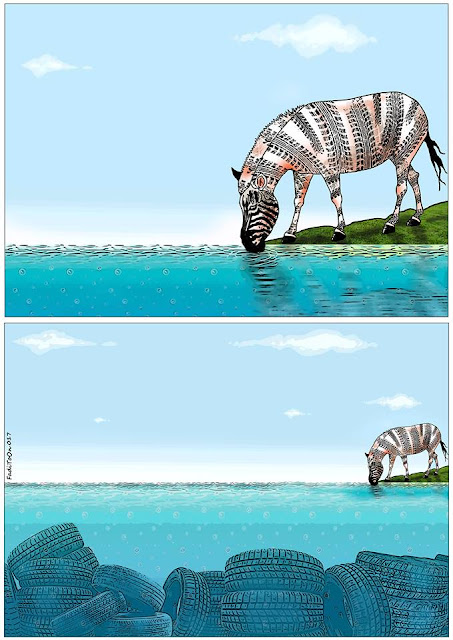There Is No Excuse
The world confronted with the one problem does not make the others go away. In fact the present situation makes for a clearcut case, how any excuse to limit the access of journalists into a country or clamp down on those who report on the virus is being used.
The right to truth is under attack. Christiane Amandpour has spoken of our need for truth not neutrality. Journalism as a profession is under attack. Journalists are persecuted or threatened with persecution, imprisoned, silenced while waiting to have their case heard at court, or killed.
So too are cartoonists.
 |
| Bonil, June 21, 2019. Freedom of Expression: It's mine! No it's miiine! |
What are the means at hand in pursuit of justice on behalf of journalists, if any? Not least considering the UN is a heavy beast to get activated, and more often than not member states will veto a proposition to act?
Such was the brief to a high level panel of legal experts on media freedom on behalf of the International Bar Association of which the first of four reports was presented in February: Report on the Use of Targeted Sanctions to Protect Journalists. Their outlook is a positive one and they posed the counter-questions that since there is a global gag on freedom of speech and global leaders are becoming more united, more determined, more innovative to silence the press, shouldn't we as defenders of the press do the same? If human rights are meant to provide a minimum of protection, how can we make them more relevant?
The questions were posed at the presentation by Amal Clooney, who drafted the report. The US has had The Magnitsky Act in place since 2012, and the framework is in place the UK and Canada too to make targeted sanctions such as freezing assets or banning entry, whereby the company, regime or individual in question is not able to spend their profits or travel ensuring the recognition that "violating human rights is a game not worth the candle":
"Sanctions help to shine a spotlight on misconduct and signal a state's disapproval of it. They constitute a form of accountability. And they help to maintain pressure on the responsible actors, to deter them from continuing their abusive behaviour and discouraging third parties from doing the same" (p. 6).
The report asks for the classification of who can be defined as victims that is already in place be removed or to cover the work of journalists too. Internet shutdowns are specifically included as a systemic restriction on media freedom defying information to be distributed (p. 70).
Targeted sanctions can be deployed as a response to a range of conducts. To take one example they can target front-line actors within a regime such as judges and prosecutors to send a message and act as a possible deterrent (p. 68).
The report suggests that a committee be established independent of the executive branch, which would secure an arms-length assesment and make it possible for a government to distance itself if sanctions are directed towards a key alley. The report places as much focus on potential sanctions regimes such as national states and the EU that there is no argument against taking action. It is a matter of having the will and taking the interest.
The report is a positive step in asserting that it is possible to take action against the suppression of information and those who provide it. A "worldwide assault on journalists" is an "assault on the public's right to know, on core democratic values and, ultimately, on "the concept of truth itself" (p. 5).

